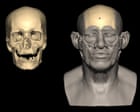
In a series of recent developments, advancements in science and technology are not only enhancing our understanding of ancient civilizations but also reshaping contemporary health systems and industries. These strides promise to bring about significant changes in various fields, from archaeology and pest control to healthcare and finance.
In a remarkable achievement for ancient DNA studies, scientists have successfully completed the whole genome sequencing of an ancient Egyptian individual for the first time. The skeleton, believed to belong to a potter who lived over 4,500 years ago, was recovered from a sealed pottery vessel in a rock-cut tomb in Nuwayrat, Egypt. The unusual burial method provided a conducive environment for DNA preservation, allowing scientists to collect and analyze genetic material that has withstood millennia. This breakthrough offers new insights into the lives of people during the Age of the Pyramids and marks a significant milestone in the field of archaeology.
Simultaneously, the United States is taking a novel approach to pest control in its fight against the new world screwworm fly, a threat that could have severe repercussions for the agricultural and livestock industries. Utilizing a technique previously proven effective, the US government plans to release billions of sterilized insects over regions in Mexico and southern Texas to curtail the population of this flesh-eating pest. The strategy mimics an earlier successful implementation, aiming to protect vital agricultural resources and the ecological balance without harmful chemical interventions.
On the healthcare front, the UK is poised to transform its National Health Service (NHS) through digitization, led by Health Secretary Wes Streeting. The cornerstone of this transformation is an expanded NHS app, envisioned as a “doctor in your pocket,” which seeks to enhance patient autonomy and streamline services. This ambitious digital overhaul is expected to reduce the need for frontline workers by 2035, relying instead on improved efficiencies derived from technology. By giving patients easier access to their health data and care options, the initiative aims to foster a more proactive approach to personal health management.
In the realm of technology and finance, Nvidia, a leading chip manufacturer, is on the verge of becoming the world’s most valuable company. Recently achieving a market valuation of $3.92 trillion, Nvidia is steadily approaching new historical heights in the stock market. This milestone reflects the burgeoning demand for advanced computing technologies and the company’s significant role in driving innovations across various sectors, including artificial intelligence and gaming. As Nvidia continues to push the boundaries of what’s possible with semiconductor technology, its impact on the global economy becomes increasingly profound.
Collectively, these developments underline an era of rapid innovation and exploration, showcasing the potential of scientific inquiry and technological ingenuity to unlock new possibilities and address modern challenges. As we forge ahead, such advancements not only bolster our understanding of both past and present but also pave the way for building a more efficient, sustainable, and informed future.
Source: {link}
